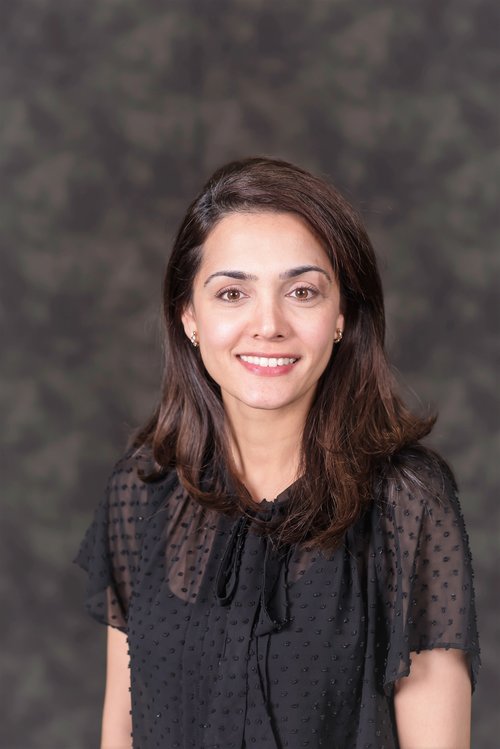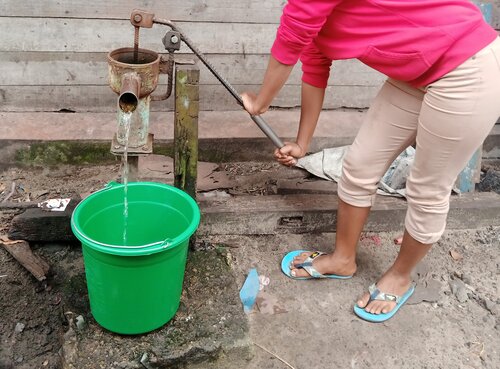USF COPH internal seed grants help faculty research efforts blossom
A story of growth
One USF College of Public Health (COPH) internal seed grant has helped the research efforts of Dr. Mahmooda Khaliq Pasha, assistant professor of social marketing, blossom into more than half a million dollars.
As a result of the work she was able to do because of the COPH’s internal grant, Khaliq Pasha said she’s obtained and applied for additional research grants, including funding from the National Science Foundation (NSF) and National Institutes of Health (NIH), and completed two published manuscripts, with more in the works. The $28,000 grant she was awarded in 2019 helped her to kickstart a long-standing collaboration with the USF College of Engineering to decrease exposure to lead through water in Madagascar.

The team developed a social marketing campaign, centered on a training program for local manufacturers of hand pumps—teaching them to replace lead components with locally sourced materials.
“As you can imagine, in a community with a low understanding of lead and its health consequences, sudden change in the norm can create a sense of unease,” said Pasha, who is also associate director of the WHO Collaborating Centre on Social Marketing and Social Change. “That’s especially true if it’s initiated by folks who aren’t necessarily representatives of your community.”
Khaliq Pasha brought in her expertise of social marketing to work with the community to make those changes for a better public health outcome.
As a result of the COPH’s seed grant, Khaliq Pasha has been able disseminate the results in:
“Midstream Players Determine Population-Level Behavior Change: Social Marketing Research to Increase Demand for Lead-Free Components in Pitcher Pumps in Madagascar,” in International Journal of Environmental Research and Public Health in 2021.
“Health and Economic Consequences of Lead Exposure Associated with Products and Services Provided by the Informal Economy” in Environmental Science & Technologyin 2021.
She said she credits the COPH’s seed grants for doing what they are intended to do.
“The funding was vital to my success as an assistant professor, it provided me with the support to start an independent research project,” she said.
She said that she now has a research team with the College of Engineering that meets weekly, consisting of a postdoctoral fellow, doctoral students, and master’s students who are advised on conducting research from both an engineering and social marketing lens.
With the NSF grant, Khaliq Pasha said they will be able to expand this even further. She will be serving as co-PI alongside principal investigator Dr. Jeffrey Cunningham of the USF College of Engineering.
“In essence, we’re creating a pipeline of social marketers and engineering students working together on water safety and quality issues in an international setting. We are forging this relationship between our students, our faculty, to get this new initiative off the ground,” she said.

“The COPH internal grants provide resources that are sufficient for doing high-quality research and disseminating it.”
2021-2022 Awardees
According to Dr. Dina Martinez Tyson, chair of the college’s research committee funding these grants, a total of 15 proposals were received for this year and seven were awarded.
“We are delighted that COPH can provide this level of support to faculty. Our hope is that the funds provided will stimulate research collaborations and lay the foundation for future external grant applications, as illustrated by Dr. Khaliq Pasha’s work,” Martinez Tyson said. “We had a very robust response to the call for proposals that was released this past summer. To see that level of interest from faculty is outstanding. We are glad we were able to fund the top seven proposals with support from COPH.”
The 2021-2021 awardees are:
Dr. Monica Uddin, professor of psychiatric genomics
Epigenetic profiles of treatment resistant depression (TRD) and response to transcranial magnetic stimulation (TMS)
“This seed grant is enabling our research team to ‘take a risk’ that would otherwise have been prohibitively expensive/costly to undertake. The TRD population is challenging to work with due to the severe and chronic nature of their depressive symptoms. This funding is allowing us to work with an initial pilot site we have started to work with in South Tampa—The TMS of South Tampa Clinic under the direction of Dr. Kenneth Pages, while also recruiting from Dr. Currier’s Neurotherapies clinic here at USF. In addition, the project is facilitating major new research opportunities for the first PhD student in genomics, Jan Dahrendorff, who will be critical to all aspects of this work.”
Dr. Rays Jiang, associate professor of systems biology
Tracking the first global pandemics
“The first global pandemics happened more than 1,000 years ago. Large waves of plagues (541-767 AD) torched across the entire Mediterranean Basin, affecting Northern Europe, South Arabia and Africa. Similar to the spread of COVID-19, global trade and cultural exchange precipitated the calamity of the first pandemic. My colleagues in USF Anthropology, [Morsani] College of Medicine, and Florida Atlantic University and I will use ancient DNA to track down this first world pandemic. The team will study biomaterials of plague victims excavated in Jerash, Jordan, a hub of the historical silk-road linking continents, and a nexus of trans Afro-Eurasian trade. We aim to uncover pathogen transmission patterns and human genetics in one of the world’s first cosmopolitan cities. The team will establish transdisciplinary expertise from anthropology to genomics and is in the process of developing related NSF projects with international outreach programs.”
Dr. Amy Alman, associate professor of epidemiology
The Oral Microbiome, Immunophenotype, and COVID-19 Post-Acute Sequelae
“Approximately 30 percent of those who survive the acute phase of COVID-19 experience enduring symptoms, such as fatigue, loss of taste or smell, dyspnea, “brain fog” and chest pain. This has been called “post-acute sequelae of COVID-19” (PASC) and has affected individuals across the full spectrum of disease severity. It is not currently understood what factors lead to PASC. I am very excited to be working with an excellent team of investigators across USF to accomplish the objectives of this project. This grant will allow us to better understand post-acute sequelae of COVID-19.”
Dr. Amy Stuart, professor of environmental health and science
Pilot study and methods development on the use of low-cost sensors and citizen science to reduce air pollution exposure inequality and empower vulnerable communities
“Traffic-related urban air pollution disproportionately affects historically disadvantaged communities. For example, neighborhoods that are predominantly Black and Brown or have high poverty rates often have higher levels of air pollution exposure; residents also have poorer outcomes for related health effects. However, these same communities have also been less empowered to engage in the environmental decision-making processes that could affect such inequality. With this grant, we will develop methods and pilot data for community air pollution monitoring in the Tampa Bay area using low-cost sensors and citizen science, and we will plan a study on the effects of this community participation in research on empowerment of historically disadvantaged neighborhoods in urban decision making. I am excited to have this opportunity to address such an important public health problem affecting our local communities, while positioning our team to compete for a large external grant that could help to improve urban environmental health and health equity broadly.”
Prephugee: Pilot test of a curriculum to increase awareness and self-efficacy toward disaster preparedness
“Florida is home to an array of natural disasters. It also has the largest refugee program in the nation. Strengthening local preparedness is viewed as an essential element in effective response and recovery. The complexity of preparedness among refugees is further increased due to limited resources, temporary housing and language barriers. Many refugees and visitors underestimate the enormity and scale of natural disasters. In addition, people require sufficient knowledge, motivation and resources to engage in preparedness and planning, which are offset by a lengthy resettlement procedure. In this project called “Prephugee,” we are developing a community-based, customized and culturally sensitive educational program to build awareness, increase knowledge and self-efficacy at individual and household levels to plan and prepare for the common emergencies in Florida. This study is the first to assess the feasibility of strengthening self-efficacy among Tampa Bay refugees and employs two delivery settings to evaluate the efficacy of classroom vs. community outreach in meeting the goal of achieving household disaster preparedness.”
Dr. Jesper J. Madsen, research assistant professor
Improving stability of Plasmodium vivax malaria vaccine antigen
“Plasmodium vivax is the leading cause of malaria outside of Africa. The blood-stage infection causes a debilitating, often life-threatening disease especially in young children, and an increased risk of low-birth-weight babies in pregnant women in the resource-limited endemic countries. There is parasite resistance to currently available anti-malarial drugs. Hence a vaccine is urgently needed to protect against disease and prevent transmission. [This grant] gives me the opportunity to enter a new field of tremendous public health significance. I think we have a solid chance of actually improving on the current state-of-the-art in the most promising vivax malaria vaccine candidate. Vaccine development is usually extremely laborious and typically will take many years or even decades. People might forget this since the most recent breakthrough in vaccine development, the COVID-19 vaccine, was created in what appears to be a record-breaking time. However, it’s important to realize that pre-pandemic scientific research done by McLellan and Graham, who was engineering the spike protein for a MERS vaccine, just happened to work out perfectly for also creating a COVID-19 vaccine in only months. We are seldom this lucky and for a malaria vaccine to be successful, there’s still more work to be done. With this proposal, we can take another step in that direction.”
Dr. Arlene Calvo, associate professor of community and family health
Inequality of Latinx communities in the U.S., Latin America, and Globally: Salud Latina USF
“During the COVID-19 pandemic, it was evident that public health interventions were lacking appropriate science-based information in a language that the communities understand; this applies to many health issues and social outcomes. The Latino population has been one of the most affected due to the COVID pandemic, both in the U.S. and in their countries of origin. The Salud Latina USF initiative is an appropriate forum to understand the reasons for the disparities.”
Story by Anna Mayor, USF College of Public Health
